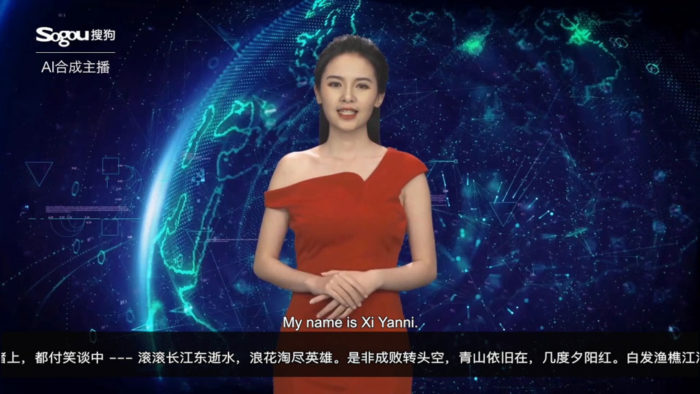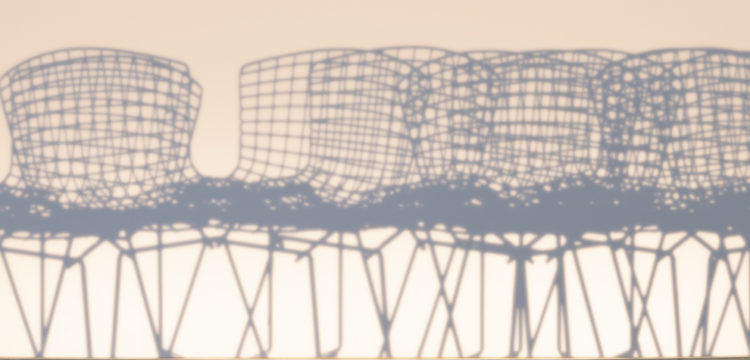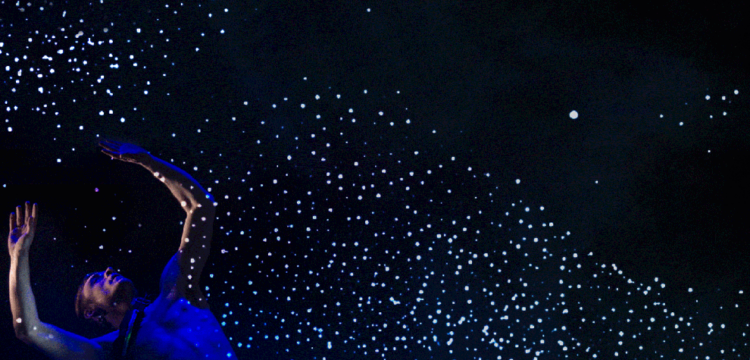A Monologue for a Monotone Speaker
On dealing with another socio-political context in dialogue with an Artificial Intelligence
For the upcoming exhibition An Inquiry: Modes of Encounter, curated by Biljana Ciric, and presented by Times Museum, in Guangzhou, China, Mario García Torres has been invited to produce a new piece. Below the artist discusses his new project currently being developed with Sogou. Earlier this year, the Chinese tech company released an Artificial Intelligence based news anchor for the Chinese broadcasting agency Xin Hua. The proposal by García Torres implies a script to be delivered by an AI character in a video.
Biljana Ciric: When I reached out to you, the first time, with an invitation to participate in this project, you were very specific about your interest. Many artists invited would first visit China to research and spend some time in the local environment; however, you came to China, making your first ever trip, with a very specific aim and interest. Maybe you can describe a little bit of why and where that interest come from?
Mario García Torres: Let’s talk about two questions that are intertwined here: the first has to do with my early proposal for An Inquiry… and the other with a certain reaction to foreign invitations (meaning from contexts an artist is not that familiar with), which discusses the viability, today, of site-specificity.
If we were to save today the notion of working in a site-specific way, we would not be able to consider that a geographical notion, but maybe a particular discourse as the site of production. Somehow, I started to think that my proposal for an exhibition in China shouldn’t necessarily be around a certain political history or socioeconomic context, but more around a hypothesis of ideas, dreams, and visions of the future, all developed through technology in that area of the world. That is something you can have a sense of today, from far away. I like the idea that those coming-times projections could become the context of the work.
An important part of the way an invitation like this is negotiated, has to do with respecting the specificities of that context and inventing a place where my subjectivity and that of the context could coexist. It might be possible to arrive at that place through collaboration with a local entity. Before your invitation, curiosity had led me to read what I could around the development of Artificial Intelligence in China, and its seemingly prevailing impact in that society today. I started to think that the minds around AI in China, could become a certain interlocutor for my own ideas developed back home in Mexico. That’s what happened, and what has turned this research trip into a kind of business-meeting-marathon.
What is the local entity?
I have made a few stage monologues now, and I hope I can keep developing that part of my practice. In this case, I kind of dreamt that an AI character could become the shape of that translator, or interpreter of my ideas in China, instead of an actual person-actor. I think the conversation we have had throughout this trip will certainly impact the development of my final script. In any case, I am certain that the final work will still be shaped by my pre-trip assumptions, and this experience as well.
Can you talk a little more about the script?
It’s very difficult to talk about it right now.
Maybe how does this relate to your previous works? It’s a different departure?
A lot of my work tends to start from writing. Lately, it feels like the spoken scripts, or monologues, have prevail a certain part of my practice. So far, I have made three stage monologues, and I hope I can keep developing more. In a way it’s so obvious, but I think it is very interesting what happens when someone with a specific idea in mind speaks directly to you, in the flesh. I think that public engagement in this way is very different than say, a film, or a painting. Even in relation to other performative or dance driven works, I think the most straight-forward presentation of an argument as speech is still very powerful.
In terms of content, the monologues I have made so far are some kind of defense against progress, and the imposing certitude of the factual, or the rational. One of them defends failure as a mode of operation, another tells the story of a mathematician that throughout his life gives all his reasoning to poetry, and yet another argues for hesitation, for delaying decisions.
What does it mean to write a monologue for the A.I. news anchor?
That’s a kind of experiment. I think that my curiosity comes from some kind of impulse; a desire to create a space where, as a spectator you don’t know exactly who is talking to you. I like the tension created by a machine that looks very much like a human. It’s a challenge to see if this robot-cum-person is able to transmit an idea too. It is in this sort of space where you allow yourself to be cheated, because you’re intrigued about this new thing you’ve never seen. That’s my main interest, but it’s still a premise, so far.

Mario García Torres, If Only I’d Thought of The Right Words (video still). Commissioned by Biljana Ciric for Guangdong Times Museum. Image courtesy the artist.
And you will release a one-minute introduction of this…
Yeah, she could be the announcer, the image of the show!
She’ll be the host for another conference before this exhibition.
Yeah, so from what we know, ours will be Yanni’s second job; the first will be as a virtual host of an online literature conference. By the time we release the work she may have been seen by some in China, but she will not have been used for too long. She will not be overly defined yet. It’s one thing I like about Yanni, she might become very famous as a broadcaster in the near future!
What does this mean for you as an artist to delve into the future?
Well, the future drive us all, doesn’t it? Not only for us in the arts, but also—in a different way—for people in science, politics, and certainly business, we make decisions in relation to what can be predicted. We live in an ahead-world. Art, itself is always about the future. Every potential rendition and every potential interpretation can only lead to another, in a continual process that never wear out itself. Thus art is perpetually coming from the future; it is never from its present. Now, in this case, I would like to think that it will be the future that impacts art in a retrofitted way. If Yanni starts doing other jobs, the meaning of the work might change, the same way we see actors differently after years of seen them play different roles throughout the years. I am not interested in a static meaning of a work, so the idea of using a character that could have an afterlife, is exciting.
What does it mean in our working context? Because technology separates us from one another, right? You also claim that you try to produce this intimate space of encounter with your practice. Where is this intimacy now, with an AI anchor performing?
It is a gamble. Lately, I have realized, at least for me, we are failing as an institution, meaning the institution of art. Numbers in art museums are greater than ever, but when it comes to films, and more time-demanding works, we are further away than ever. Some of my own works in that sense, are not successful in that space anymore. They have become rumors, abstract tales, which I like, but they have definitely changed in this youtube-instagram era. Habits change, and with that, the meaning and the accuracy of works of art. I think that today, time-consuming works, are only able to survive in the intimacy of the home, maybe the office. If those works at some point defined themselves as searchers for brave publics, today, their only hope is for an ever-reducing niche, the real brave. Survival of ideas, are reduced to a shorter and shorter attention span, and transcendental circulation is maybe reduced to non-public consumption.
As for Yanni, I am not sure what’s going to happen. I still need to test, how successfully she manages to transcend those limitations. I am betting on that intriguing place created by a non-human-humanoid.
What was the process of writing the script for Yanni like? You knew what she looks like, how she talks… Reading the script, my personal impression was that the piece is also very much about us, functioned as a projection of us, describing the basic human desire: “never perfect but almost.” As much as Yanni may be an AI, she is also a news anchor and us in many ways.
As soon as I saw our Yanni speak the first short script I wrote, it was very clear to me that it was a ghostly entity. If it’s true that we experience an eerie feeling when looking at a digital robot behave and look so precisely like a person, it gets even more intriguing and awkward when it speaks your own words. There I understood that more than the space between our hope and our fear for robots to take over our world, it is a projection, an image, like a ghost. As such, I think this AI news anchor exists in a kind of in-between space; not necessarily between the living and the dead, but between the possibility of a bright future and a certain societal dead end. And so, the AI is built upon our hopes and projections of what we wish we could become. This is where the discourse around the notion of the mirror began to appear in the script. The AI actress as a never-quite-perfect creation but at the same time, a projection of an upgraded version of ourselves as humans.
Can you discuss the decision to turn the script into eleven different chapters?
The development of eleven chapters was a totally circumstantial thing. I could have continued to develop the script much further, but I had to stop at some point and allow the script to become a real speech. What I think became even more interesting was the idea of playing the chapters in a random manner. The script is not written with the logical progression of an academic essay, but more as a never-reaching argument, where ideas are becoming but are never fully articulated. This is similar to the way that we perceive an AI robot: an almost-human being that at some point fails to succeed in becoming truly human. The eleven chapters contain ideas that roll-over and keep moving onward in an unsystematic way. I tried to be very open when choosing the paths for the ideas to take in an effort to imitate the superficial progression of internet based research—where philosophy, facts, and pop culture are placed all on the same level. So, as there is no final argument, I thought the script could be read in any direction.
One interesting aspect I noticed in how you developed the mode of delivering the monologue for Yanni was that she didn’t know how to take pause. The pauses that you introduced into the writing of the script seem to be very meaningful, since these are things an AI generally doesn’t “comprehend.” This is particularly interesting within the context of the exhibition, which addresses notions of slowness in a number of ways, which is posed as opposite to the notion of progress. Can you elaborate on this aspect of the work?
Writing a monologue for a monotone speaker is a real challenge. There are no subtleties; there is no excitement nor intimate forms of speech, as in human speech. Very early on, it became clear to me that the only thing the AI actress could do, to become human, was to reject being a robot, and stop—pause—reject the development of its function. When I realized this, I started to introduce such pauses more and more. I think they speak to what we humans call the beauty of imperfection. It felt that it was, in this case, the only way a robot could refuse a program, and by doing so it would gain some additional level of humanness, because it will connect what is being said with confusion, and further with an off-moment to think, to consider what to say next. Every time she pauses, there is a radical change in the monologue, as if she is rerouting her ideas. I hope others perceive these moments in the work.



